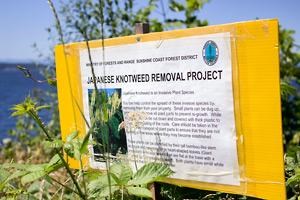To raise awareness, Invasive Species Council of BC has dedicated June Invasive Species Action Month.
In Powell River, residents have long fought the battle against invasive species—Scotch broom, English ivy, Japanese knotweed and giant hogweed—along highways, as well as in parks, aquatic areas and gardens.
“Education is key,” said Betty Zaikow, chair of the Sierra Club’s Malaspina branch, who organizes monthly ivy pulls as well as broom bashes on Texada Island and around Myrtle Creek. “There are so many invasive species it really needs a community-wide effort.”
According to Gail Wailin, executive director of the invasive species council, “60 per cent of invasive species are introduced through gardening and landscaping.”
Invasive plants, like the fast-growing Japanese knotweed, are of concern to Rachelle McElroy, executive director of the Coastal Invasive Species Committee. She explained how, because they can grow through concrete, they often cause expensive damage to house foundations.
“This one spread because it’s so easy to share cuttings between neighbours,” said McElroy. “In the UK some banks won’t even give you a mortgage if the home has knotweed.”
Knotweed, as well as giant hogweed, also requires constant trimming along highways, where it can cause accidents by blocking sight-lines, said McElroy. Additionally, the plant is nearly impossible to eradicate once established in waterfront areas because there are no approved aquatic herbicides in BC.
Action month is also a time to raise awareness of invasive aquatic species, particularly zebra mussels and Eurasian watermilfoil lake weed. Both species can quickly take over a fresh water lake and crowd out native species.
“Powell River doesn’t have these species yet, but vigilance is important,” warned McElroy. “There are so many ways invasive species can spread, and it’s so hard and costly to get rid of them once they are established.
“Humans, cars, bikes are all vectors or ways invasive species can spread, so just be aware, clean off your equipment, and do your part to prevent the spread,” suggested McElroy.
Boaters, for example, need to clean motors and drain bilge water before going to a new area, she explained.
Zaikow said an ivy pull is planned for Saturday, June 20, behind Powell River Historical Museum and Archives, between 9 and 11 am. Interested parties are encouraged to attend with gardening gloves and clippers. For more information on ivy pulling or broom bashes in the Powell River area readers can reach Zaikow at 604.485.6898.
Readers can also visit online for more information on invasive plants and Invasive Species Action Month.



